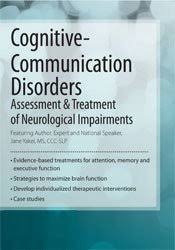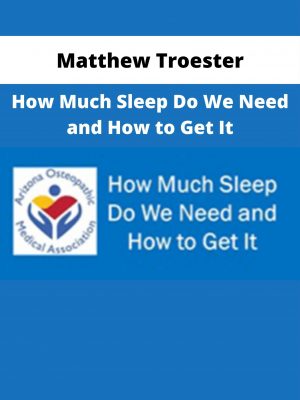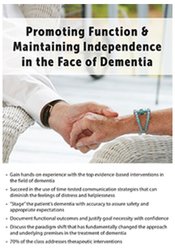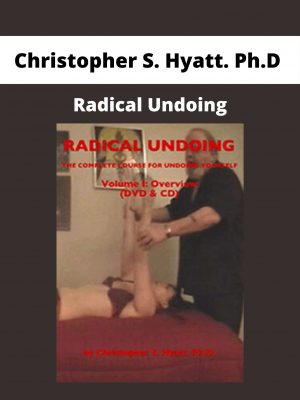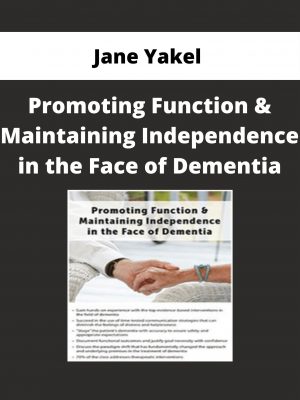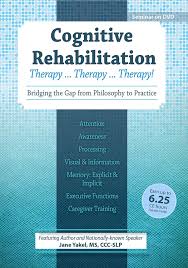Jane Yakel – Cognitive-Communication Disorders, Assessment & Treatment of Neurological Impairments
$200 Original price was: $200.$75Current price is: $75.
Shopping Instructions:
- DISCOUNT 15% : SHOP15
- Product Delivery: Within 1 – 12 hours after purchase.
Available for Pre-Order. This product will be available within a few days.
Jane Yakel – Cognitive-Communication Disorders, Assessment & Treatment of Neurological Impairments
Cognitive-communication impairments affecting attention, memory and learning can negatively affect an individual’s quality of life. These impairments can limit social interaction and diminish a person’s ability to assimilate information needed for learning. In order to achieve successful patient outcomes, it is essential that practitioners understand the processes underlying cognitive-communication impairments, choose relevant assessment instruments and apply critical thinking skills when developing interventions.
Join Jane Yakel for this dynamic and informative seminar. Through case studies and interactive learning, Jane reveals the essence of cognitive-communication disorders and offers a neuroscience model used to guide intervention. Relating this model to levels of therapeutic interventions, specific therapy techniques, and individualized strategies, she will provide you with evidence-based approaches to therapy focusing on the key domains of cognitive-communication: attention, memory and executive function. You will leave with effective and practical intervention strategies that can be readily applied to your current patient caseload.
Objectives:
At the completion of this program, you should be able to:
- Distinguish between the specific types of attention deficits and discuss therapeutic interventions to ensure effective outcomes.
- Differentiate between the “stages” and “systems” models of memory and discuss effective treatment strategies for improving memory function.
- Describe the models of care for cognitive rehabilitation with respect to specific diagnoses and rehabilitation settings.
- Distinguish between memory systems and identify appropriate intervention techniques for specific patient diagnoses.
- LExplain executive functions and identify the most effective intervention strategies for specific targeted behaviors.
- List specific techniques and strategies for maximizing brain function and preventing further cognitive decline.
- Implement critical thinking and problemsolving skis to develop highly individualized therapeutic interventions.
- Design individualized and measurable goals for cognitive-communication deficits.
Program Outline:
- Archives of the Brain
- Developing a critical thinking approach to therapeutic intervention
- Full spectrum of neurological disorders
- Attention / Visual Processing / Processing Speed
- Types of attention & attention deficits
- Visual Field Neglect vs. Visual Field Loss
- Processing Speed and Attention
- Case studies: Learning Assessments
- Comprehensive Patient Assessment
- Philosophy
- Approaches
- Principles
- Models
- Procedures
- Attention Assessments /Treatment
- Assessments / Tests for attention deficits
- Attention therapeutic interventions
- Medical management of Attention
- Documentation
- Medical Necessity
- Goals: Patient Centered Goals
- Skilled Documentation / Daily / Weekly
- Memory Domain
- Normal vs. pathological memory loss
- Reversible vs. irreversible memory loss
- System Memory: Declarative vs. Non-Declarative and all subsystems of memory
- Memory Assessments
- Quick and Simple Assessments
- Normed Based Assessments
- Criteria Bases Assessments
- Maximize Brain Function/Health Management
- Memory’s worst enemies
- Prevention of normal memory loss
- Depression with neuropathology
- Approaches of Therapeutic Interventions
- Traditional cognitive didactic approach
- Compensatory strategies
- unctional experiential approach
- Adaptation Approach of Memory
- Executive Functions
- Definition, development, importance of high level cognitive abilities
- Responsibilities of executive functions
- Behaviors associated with EF impairments
- Assessments/tests for executive function deficits
- Treatment of targeted executive function behaviors
- Environmental interventions and strategies
- Case Studies: Learning assessment
Would you like to receive Jane Yakel – Cognitive-Communication Disorders, Assessment & Treatment of Neurological Impairments ?
Related products
HEALTH & MEDICAL
Matthew Troester – How Much Sleep Do We Need and How to Get It
HEALTH & MEDICAL
Gaia—Creating-High-Voltage-Health-with-Glenn-Streeter-Open-Minds
HEALTH & MEDICAL
HEALTH & MEDICAL
Dr Heidi M Crocker – Yoga Alignment | Speaker: Heidi Crocker EdD, DC
HEALTH & MEDICAL
NLP & Hypnosis



